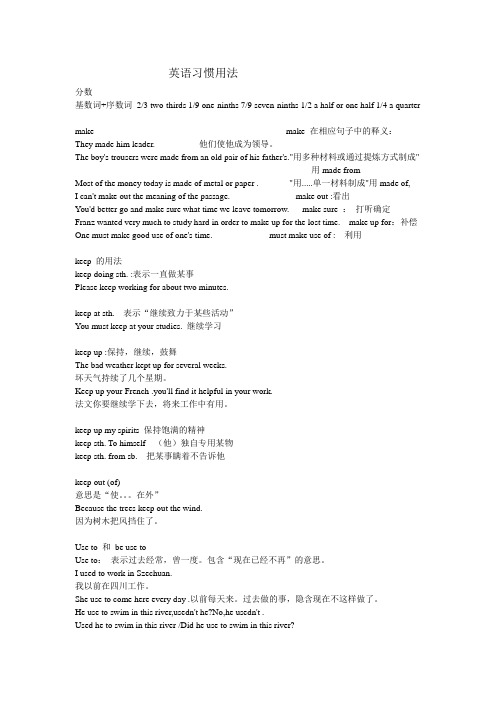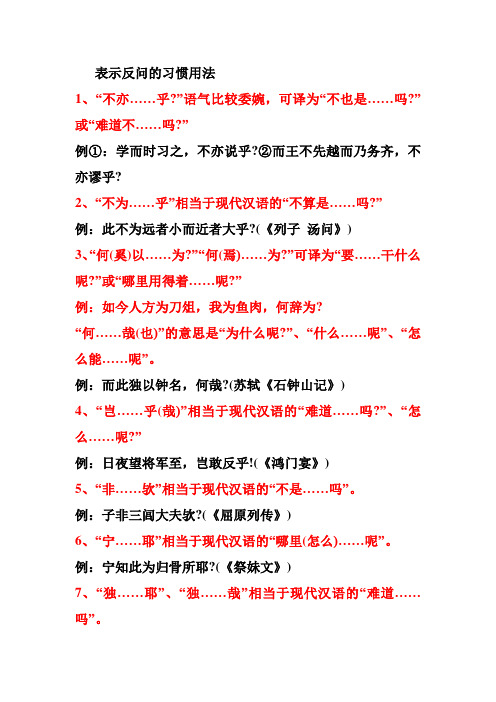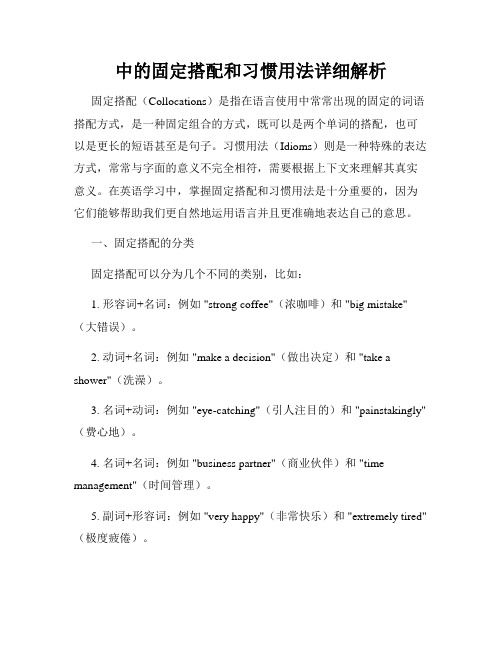习惯用法
habits的用法总结

habits的用法总结习惯,是我们每个人生活中都离不开的一部分。
它们可以塑造我们的人格、影响我们的行为,并且对于我们的成功与否起着关键作用。
在本文中,将探讨habits (习惯)的用法总结,包括如何养成良好的习惯以及如何改变不好的习惯。
一、养成良好的习惯1.设定明确的目标要养成良好的习惯,首先需要设定明确、具体和可量化的目标。
例如,如果你计划每天锻炼30分钟,那么你就要将这个目标写下来,并且设定一个特定的时间和地点来执行。
2.逐渐建立习惯需要时间才能形成。
因此,在一开始时候不要太过于追求完美或者过高期望自己。
相反,采取逐渐增加强度或时间的方式来建立习惯是更有效和可持续发展的。
3.与他人分享与他人分享你正在养成新习惯可以给自己带来更大的动力和责任感。
告诉身边亲朋好友你计划养成什么样子良好习惯,并邀请他们帮助你的监督和鼓励。
4.保持坚持养成良好习惯需要坚持和毅力。
尽管开始时可能会有困难,但只要你能够坚持下来,并且每天都积极地向目标靠近一步,那么最终成功就在不远处。
二、改变不好的习惯1.认识到问题改变一个不好的习惯首先需要认识到自己有问题。
这可能需要一些内省和真实的自我评估。
问问自己,这个习惯是否对我有益?它是否妨碍了我的生活或事业发展?2.找出触发点触发点是导致我们之前行为的原因或情境。
通过找出触发点,我们可以更容易地控制自己并改变不好的习惯。
例如,如果你抽烟是因为压力大,那么处理压力的方法可能会对你戒烟很有帮助。
3.替代行为将不好的习惯替换为积极、健康或有益的行为是一个关键步骤。
找到一个与原始行为相对应且满足同样需求的替代行为,可以让你渐渐放弃不好的习惯。
4.寻求支持改变不好的习惯往往需要外部的支持和帮助。
告诉身边的人你的决心,并请求他们给予理解、鼓励和支持。
他们可以是你的家人、朋友或专业人士。
5.坚持与奖励改变不好的习惯是一个长期而艰难的过程,需要我们保持坚持和耐心。
为了增加动力,你可以设定一些小目标,并在达成之后给予自己适当的奖励。
英文习惯用法

英语习惯用法分数基数词+序数词2/3 two-thirds 1/9 one-ninths 7/9 seven-ninths 1/2 a half or one half 1/4 a quartermake make 在相应句子中的释义:They made him leader. 他们使他成为领导。
The boy's trousers were made from an old pair of his father's."用多种材料或通过提炼方式制成"用made fromMost of the money today is made of metal or paper . "用.....单一材料制成"用made of,I can't make out the meaning of the passage. make out :看出You'd better go and make sure what time we leave tomorrow. make sure :打听确定Franz wanted very much to study hard in order to make up for the lost time. make up for:补偿One must make good use of one's time. must make use of : 利用keep 的用法keep doing sth. :表示一直做某事Please keep working for about two minutes.keep at sth. 表示“继续致力于某些活动”You must keep at your studies. 继续学习keep up :保持,继续,鼓舞The bad weather kept up for several weeks.坏天气持续了几个星期。
Unit 4 习惯用法语法

你想要某物/做某事吗?
Would you like to have a try?
You could dosth.
你可以做某事。
You could write to her.
2、常用答语:
肯
定
答
语
Good idea! / That’s a good idea! / OK. / All right. / Great.
Unit 4习惯用法语法
一、习惯用法:
1.allowsb. to dosth.允许某人做某事
2.Whydon’t you dosth.?你为什么不做某事呢?
3.wantto dosth.想要做某事
4.wantsb.to dosth.想要某人做某事
5.letsb. dosth.让某人做某事
6.mindsbdoingsth.介意某人做某事
14. It’s +adj(形容词)+to dosth.做某事是…的。
二.语法讲解:
(一)Why don’t you…?等提建议的句型及常用答语
1、常用提建议的表达:
句型
意义
例句
Why don’t you dosth.?
= Why not dosth.?
你为什么不做某事呢?
Why don’t you talk to your parents?
7.findsbdoingsth.发现某人在做某事
8.refuseto dosth.拒绝做某事
9.offerto dosth.主动提出做某事
10.tellsb.to dosth.告诉某人做某事
11.not…until…直到…才…
中常见的固定短语与习惯用法

中常见的固定短语与习惯用法固定短语和习惯用法是语言中使用频率较高的表达方式,它们在日常生活和写作中扮演着重要的角色。
熟练地运用这些固定短语和习惯用法,有助于提升语言表达的准确性和流畅度。
本文将介绍一些中文中常见的固定短语和习惯用法,并分析其用法及意义。
1. 心甘情愿心甘情愿是指在内心深处乐意接受某种情况,没有任何怨言或抱怨。
它常用于描述一个人对某件事或某种状况持有积极的态度。
例如,“他心甘情愿地付出了很多努力,最终实现了自己的目标。
”2. 无能为力无能为力表示无法改变或解决某个问题或情况,没有能力去做一件事。
这个短语常用于表达无法控制的局面。
例如,“面对自然灾害,我们感到无能为力,只能期待救援的到来。
”3. 举世闻名举世闻名是形容一件事或一个人在全世界范围内被广泛知晓和熟悉。
它通常用于描述一位具有杰出成就的人或一座有着特殊意义的城市或景点。
例如,“巴黎是一座举世闻名的浪漫之都,吸引了无数游客的眼球。
”4. 势不可挡势不可挡意味着形势或力量的发展势头非常强劲,无法被阻挡。
这个短语常用于描述某个事物的强大能力或某股力量的无可抗拒。
例如,“他们的团队士气高涨,势不可挡地击败了对手。
”5. 严防死守严防死守表示采取最严密的措施,坚决保卫或防守某个地方或某项利益。
这个短语通常用于描述对某种价值或权益的保护态度。
例如,“为了保护国家边境安全,士兵们严防死守,任何入侵者都无法通过。
”6. 时时刻刻时时刻刻意味着每时每刻、始终如一,强调时间的连续性和连贯性。
这个短语用于描述某种状态或行为持续不断。
例如,“我们要时时刻刻保持警惕,不能有丝毫松懈。
”7. 反复无常反复无常描述一个人或事物在态度、行动上变化无常,难以预测或理解。
这个短语常用于形容某人易变的性格或某事物善变的特点。
例如,“他的情绪反复无常,让人难以捉摸。
”8. 非同凡响非同凡响表示与众不同、与平凡不同,指出某人或某事物在某个方面有着出众的表现或特点。
这个短语用于形容某个人或事物的独特之处。
表示反问的习惯用法

表示反问的习惯用法1、“不亦……乎?”语气比较委婉,可译为“不也是……吗?”或“难道不……吗?”例①:学而时习之,不亦说乎?②而王不先越而乃务齐,不亦谬乎?2、“不为……乎”相当于现代汉语的“不算是……吗?”例:此不为远者小而近者大乎?(《列子汤问》)3、“何(奚)以……为?”“何(焉)……为?”可译为“要……干什么呢?”或“哪里用得着……呢?”例:如今人方为刀俎,我为鱼肉,何辞为?“何……哉(也)”的意思是“为什么呢?”、“什么……呢”、“怎么能……呢”。
例:而此独以钟名,何哉?(苏轼《石钟山记》)4、“岂……乎(哉)”相当于现代汉语的“难道……吗?”、“怎么……呢?”例:日夜望将军至,岂敢反乎!(《鸿门宴》)5、“非……欤”相当于现代汉语的“不是……吗”。
例:子非三闾大夫欤?(《屈原列传》)6、“宁……耶”相当于现代汉语的“哪里(怎么)……呢”。
例:宁知此为归骨所耶?(《祭妹文》)7、“独……耶”、“独……哉”相当于现代汉语的“难道……吗”。
例:相如虽驽,独畏廉将军哉?(《廉颇蔺相如列传》)8、“何所”,表疑问的固定结构。
是“所……者为何”的移位和压缩。
可译为“……的(人、事、物)是什么”。
例:问女何所思,问女何所忆。
(《木兰诗》)9、“何……之有”是“有何……”的倒装,相当于现代汉语的“有什么……呢?”例①宋何罪之有?(《墨子公输》)②夫晋,何厌之有?“何有”单用,可根据上下文译为“有什么困难”“有什么舍不得”“有什么关系”例:默而识之,学而不厌,诲人不倦,何有于我哉?10、其……乎(邪),译为“难道……吗?”例:圣人之所以为圣,愚人之所以为愚,其皆出于此乎?(韩愈《师说》)11、“安……乎”、“安……哉”连用,表疑问,相当于现代汉语的“怎么……呢”、“哪里……呢”。
12、得无……乎,反问的语气比较委婉,且略带测度性。
句末“乎”可用“与(欤)”、“邪”、“耶”等疑问语气词替换。
可译为“该不会……吧”、“莫非是……吧”、“能不……吗”。
英语中的固定搭配和习惯用法总结

英语中的固定搭配和习惯用法总结
1.固定搭配(ms and ns)
固定搭配是指在英语中频繁使用的一些固定组合的词汇,其意义往往不能从单个单词的意思推测出来。
以下是一些常见的英语固定搭配:
to kick the ___:去世
to break the ice:打破僵局
___:泄露秘密
to hit the nail on the head:一针见血
___:开夜车
2.惯用法(matic Usage)
惯用法是指在英语中惯常使用的表达方式,它们的用法可能有些特殊,需要掌握固定的词序或句型。
以下是一些常见的英语惯用法:
to make a difference:产生影响
to take a back seat:退居次要地位
to give ___:帮助某人
to keep an eye on:密切关注
to play it by ear:随机应变
3.练建议(Practice Tips)
要提高对固定搭配和惯用法的掌握,可以采取以下方法:
阅读英语文章和书籍,特别关注其中常用的固定搭配和惯用法;
练使用固定搭配和惯用法来表达自己的想法,写作时尽量使用
这些表达方式;
参加英语口语角或者与他人进行英语对话时,积极运用这些固
定搭配和惯用法。
希望以上总结对您研究和使用英语中的固定搭配和惯用法有所
帮助!。
语法固定搭配和习惯用法的辨析

语法固定搭配和习惯用法的辨析语法固定搭配和习惯用法是语言学习中的一个重要部分,对于汉语学习者来说,辨析这两者有助于提高语言运用的准确性。
本文将对语法固定搭配和习惯用法进行辨析,并给出一些例子以便更好地理解。
一、语法固定搭配语法固定搭配是一组特定的词语在句子中出现时具有固定的搭配方式,这些搭配方式往往不可以改变,且整体的意思与词语的字面意义相差较大。
下面是几个常见的语法固定搭配:1. 一帆风顺:形容事情顺利进行,没有任何困难或问题。
例句:我们公司的业务正处于一帆风顺的发展阶段。
2. 心甘情愿:表示心里愿意,没有任何勉强或异议。
例句:他心甘情愿地为团队做出了自己的贡献。
3. 如鱼得水:比喻处在适合自己的环境中,感到非常舒适和自在。
例句:在这家公司工作,我感觉就像是鱼儿得水般自在。
二、习惯用法习惯用法又称为习语,是指在语言中形成并广为接受的一些惯常表达方式,具有共同的语义特征,并且在语言交流中使用频率较高。
下面是几个常见的习惯用法:1. 一脸懵逼:形容对某个事物或情况完全不了解或糊涂。
例句:当老师突然提问时,他一脸懵逼,不知道如何回答。
2. 画龙点睛:比喻在文章或演讲的最后关键部分,加入一两句独到的点明主题的话。
例句:这篇文章写得很好,最后一句话真是画龙点睛。
3. 不可思议:表示某件事情难以想象或理解。
例句:他的成绩进步太大了,简直是不可思议。
通过以上例子,我们可以看出,习惯用法在表达上更加生动形象,给人留下深刻印象,而语法固定搭配则更加严谨和准确。
三、辨析在学习和使用中文的过程中,我们应该能够辨别何时使用语法固定搭配或习惯用法,以便准确表达自己的意思。
虽然两者都是固定的短语,但其使用场景和表达方式略有不同。
语法固定搭配更加注重句子结构以及搭配的准确性,常常出现在正式文体中,比如合同、报告等。
习惯用法则更多地出现在口语和非正式文体中,使得语言更加生动有趣。
在写合同时,我们通常会使用一些常见的固定搭配,比如“履行合同”、“违约责任”等。
中的固定搭配和习惯用法详细解析

中的固定搭配和习惯用法详细解析固定搭配(Collocations)是指在语言使用中常常出现的固定的词语搭配方式,是一种固定组合的方式,既可以是两个单词的搭配,也可以是更长的短语甚至是句子。
习惯用法(Idioms)则是一种特殊的表达方式,常常与字面的意义不完全相符,需要根据上下文来理解其真实意义。
在英语学习中,掌握固定搭配和习惯用法是十分重要的,因为它们能够帮助我们更自然地运用语言并且更准确地表达自己的意思。
一、固定搭配的分类固定搭配可以分为几个不同的类别,比如:1. 形容词+名词:例如 "strong coffee"(浓咖啡)和 "big mistake"(大错误)。
2. 动词+名词:例如 "make a decision"(做出决定)和 "take a shower"(洗澡)。
3. 名词+动词:例如 "eye-catching"(引人注目的)和 "painstakingly"(费心地)。
4. 名词+名词:例如 "business partner"(商业伙伴)和 "time management"(时间管理)。
5. 副词+形容词:例如 "very happy"(非常快乐)和 "extremely tired"(极度疲倦)。
不同的固定搭配类别拥有不同的用法和含义,掌握这些搭配可以帮助我们丰富我们的词汇量和准确地表达自己的意思。
二、习惯用法的特点习惯用法是英语中常见的语言表达方式之一,它们往往是固定的短语或句子,其字面意思和实际意义之间存在差异。
习惯用法的特点如下:1. 文化背景:很多习惯用法是根据当地的文化、历史和传统形成的,因此在不同的语言和文化中可能具有不同的表达方式。
例如,英语中的 "raining cats and dogs"(下大雨)在其他语言中可能没有类似的表达。
- 1、下载文档前请自行甄别文档内容的完整性,平台不提供额外的编辑、内容补充、找答案等附加服务。
- 2、"仅部分预览"的文档,不可在线预览部分如存在完整性等问题,可反馈申请退款(可完整预览的文档不适用该条件!)。
- 3、如文档侵犯您的权益,请联系客服反馈,我们会尽快为您处理(人工客服工作时间:9:00-18:30)。
【要点点拨】1. It’s the first time that……….(从句中用现在完成时)It was for the first time that………(强调句,对状语for the first time进行强调) It’s (high) time that……..(从句中用过去时或should do)2. It’s the same with sb. / So it is with sb.表示某人也如此(用于前句中既有肯定又有否定或两个不同类的谓语动词)3.…be about to do / be doing……when…….正要做/正在做……就在那时…….4 A is twice / three times as +原级+as BA is twice / three times the n. of B.A is twice / three times +比较级+than B5. It’s a waste of time / money doing / to do…It’s no use / good doing………It’s possible / probable / (un) likely that……….It makes great / no sense to do……做某事很有/没意义6. There’s no use / good doing…….There’s no sense / point (in) doing……There is no need for sth. / to do…….There is (no) possibility that…………(同位语从句)7.The+比较级…….., the+比较级………越…….., 越…….注意:前半句为从句,用一般现在时代替将来时;8. It seems / appears ( to sb. ) that sb…….在某人看来某人……….= Sb. seems / appears to be / to do / to be doing / to have done……..It seems / looks as if……….好象/似乎……..9.It (so) happened that sb. ……..某人碰巧……..= Sb. happened to be / to do / to be doing / to have done…..10.It is said / thought / believed / hoped / supposed …….that sb………=Sb. is said to be / to do / to be doing / to have done……….(注意:这种句型里如带动词hope则不能变成简单句,因为无hope sb. to do结构)12 …….such…….that…….如此…….以致于(引导结果状语从句)…….such……..as……像……..的这种……(as为关系代词,引导定语从句,在从句里充当主、宾、表)13. Do you mind if I do sth.? / Would you mind if I did sth.?14. The chance is that……../ (The )Chances are that……….很可能…….15.Check / Make sure / See to it / See that……..(从句中常用一般现在时) 确信/务必……..16. depend on it that……..取决于see to it that…….负责/设法做到…….注意:除了except / but / in等介词可以直接接that从句,其它介词后必须用it做形式宾语;17. It is / was +介词短语/ 从句/ 名词/代词等+that………How / When / Where / Why is / was it that………..?注意:此句型为强调句,当被强调的为表示人的词时,还可用who连接;强调主语时,从句后的谓语动词应与前面的主语保持一致;注意与定语从句的区别)18 .How is it that……..(这几个句型都表示“怎么会…….?”“怎么发生的?”)How come+从句?How does / did sth. come about? ( How did it come about that…….?)如:How come you are late again?19. There seems / appears / happens to be / must be / can’t be / is (are, was, were) said to be / is (are, was, were) thought to be…….表示“.似乎有/碰巧有/一定有/不可能有/ 据说有/认为有……..”介词(如of )there beingwant / wish / expect there to be要/希望/期待有……..adj. / adv. enough for there to be…….足够…….会有…….注意:there being / there to be为there be的非谓语形式;It is said / thought that there is / are……=There is / was / are / were said (thought) to be……. 如:I have never dream of there being such a good chance for me.It won’t be cold enough for there to be a frost tonight.20. 疑问词+插入语+陈述语序?Who do you think he’ll have attend the meeting?21. But for + n. / pron., sb. / sth. would (not) have done…..要不是……., 某人早就……(表示虚拟语气)=If it had not been for…..,……./ If there had not been ……., ……..22. It won(’t) be long before +从句(从句中用一般现在时)不久/很久就要……. It was (not) long before+从句(从句中用一般过去时)不久/很久才……..23. Those who………….(从句及主句中谓语动词用复数形式).Anyone who…………= Whoever………..(从句及主句中谓语动词用单数形式)24…….主句(一般现在时或过去时)…...when从句….(might / should do 或might / should have done) 表示”对比”,意思为“本该……(可)而却”,主句中为陈述语气,从句里为虚拟语气,如:Why are you here when you should be in school?你本该上学的怎么在这儿?He stopped trying when he might have succeeded .本该已成功了他却停止努力了.25. There is ./ Sb. have no doubt that………(同位语从句,that不可省略)There is / Sb. have some doubt whether……..(同位语从句不可用if)Sb. doubt if / whether…….Sb. don’t doubt that………26 . immediately / directly / instantly / the moment +从句on / upon + n. / doingNo sooner had sb. done than …….(过去时)Hardly had sb. done when……..(过去时)注意:这几个结构都表示“一…….就”;27. every time / each time / the last time / the first time / next time +从句(名词性短语引导一个时间状语句)anywhere / everywhere +从句(相当于wherever引导的地点状语从句)You can go anywhere you like.Next time you come, please bring your son along.28.If only / I wish +从句(用过去类时态) 表示虚拟语气, “要是…….就好了”“但愿……就好了!”29 .Considering + n. 或 pron. 或 that从句 / Seeing that……….考虑到/鉴于……. Given + n. / pron作状语,表示“在有……的情况下”“如果有”“假定”,有时也表示”考虑到”Seeing (that) he refused to help us, there is no reason why we should help him now. Given good health, I hope to finish the work this year.Given their inexperience / that they are inexperienced, they’ve done a good job.30.There was a time when…….曾经有那么一度……….31.other than与no, not, none等否定词连用,表示肯定意思,如:It was none other than Mr. Smith.这正是Smith先生.32. Not until…….did / do/ does / will sb. do……It was / is not until ……that sb………33.It’s (un) like sb. to do / to have done……做某事很像某人/ 做某事可不像某人34.It remains to be seen Wh--words ……..是否…….还有待于看.(不用that, if作连接词)35.It only remains for sb. to do……剩下的只是要某人做某事.We’ve got everything ready. It only remains for you to come to dinner.36.One moment……., and now………刚才一会儿还在做……而现在却……..37.Not all / both / everyone………表示部分否定38. Such is / are……..这(些)就是…….(谓语动词单复数由后面名词决定)39. I’d rather (not) do / have done……我宁愿…..I’d rather +从句(从句中用过去时或过去完成时)40. It’s important / necessary / strange / surprising….+that……(用陈述语气或should do)41. I like / hate / appreciate it that / when等从句 (it表示后面从句的这种情况)I appreciate it if you will give me a hand.42. By the time +从句(一般现在时/过去时),主句(将来完成时/过去完成时)43………., as is often the case with sb. / as is usual with sb.(as引导非限制性定语从句)44 in case / lest / for fear that…….(从句中用陈述语气或should do)45.While置于句首可表示As long as 或 AlthoughWhile there is life there is hope.While I admit his good points, I can see his bad ones.46. can not ( never) ……too +adj. (adv. ) / adj. (adv.) + enough “越……越好”“非常”too + adj. ( anxious / eager / willing / ready / glad等)+to do….表示肯定意思I can’t thank you enough.我非常感激你.He was too glad to see his father.=He was very glad to see his father.47. not / neve等表示否定的词与比较级连用表示最高级,如:-----Do you agree with his suggestion? -------I can’t agree more.48. What if……..要是…….怎么办?What if he doesn’t come tomorrow?49. more……..than与其…….不如……..He is more nervous than frightened.50. It is / has been +一段时间+since从句(从句中如为延续性动词,则实际表示的意思相反)It is two years since he drank.他不喝酒已两年了.【各个击破】1. Mr. Smith didn’t understand ______ made his son so upset this morning.A. what was itB. why it was thisC. how that wasD. what it was that2. -----Did you have a good sleep last night?----Yes, never sleep _______.A. badlyB. betterC. worseD. best3. We are only _____ glad to do anything we can _______ her.A. too; to helpB. very; help C too; help D. very; helping4. -----How come you are late for class again?-------_____________.A. Because I missed the busB. By bus and then on footC. Please excuse meD. It’s quite wrong5. _______more than 3,000 languages in the world.A. There are thought to beB. There is thought to beC. They are thought to beD. It is thought to be6. -----George is a wise person.-----But in my opinion, he is ______ than wise.A. clevererB. braverC. more braveD. less brave7. -----So can I ask you a few fairly straightforward questions about yourself? -----No problem. I like ________ when people are open and direct.A. thatB. thisC. itD. them8. ----______I move the picture over here?----I suppose it’ll look better.A. How ifB. What aboutC. How aboutD. What if9. China has produced ______ this year as it did in 2002.A. as twice much steelB. twice steel as muchC. twice as much steelD. as much steel twice10.-----_______was it ______ you discovered the secret of his?------Totally by chance.A. How; whenB. What; thatC. What; whenD. How; that11.-----Who on earth could it be?------It was _______ other than Clint Eastwood.A. noneB. nothingC. notD. nobody12._____his age, he did it quite well, so don’t ______ him any more.A Given; blame B. Considered; say C. To regard; scold D. Considering; speak13.No sooner _____ themselves in their seats in the theatre ______ the curtain went up.A. they have settled; beforeB. had they settled; thanC. have they settled; whenD. they had settled; than14. -----Did you meet with the famous space hero, Yang Liwei?------______I had come here earlier!A. If onlyB. If notC. But forD. For fear15.The students expected __________ more reviewing classes before the final exams.A. it would beB. there beingC. it to beD. there to be16.Students shouldn’t be given so difficult a problem _____ they can not work out.A. thatB. whichC. whileD. as17. It was twelve o’clock at midnight _______ they arrived at a lonely village.A. thatB. beforeC. sinceD. when18.-----The exam wasn’t difficult, was it?------No, but I don’t think ______could pass it.A. somebodyB. anybodyC. everybodyD. nobody19.-----I always take care when doing papers on the computer.-----You meant it! One can not be _______careful working on it.A. tooB. veryC. soD. quite20.-----Is Miss White working these days?------No. It is two months since she worked here.------Oh,_____________?A. where is she working nowB. would you please show me the wayC. which is her officeD. is she ill1.good=favorable,desirable,pleasurable2.bad=unfavorable,undesirable,unpleasurable,(be less impressive)3.many=a sea of,an ocean of,a multitude of,(many什么,if not most)4.like=be crazy about5.some=a slice of,quite a few6.more and more+名词=in growing numbers,in creasing numbers,in sidnificant numbers7.more and more+形容词=increasingly8.most+名词=an overwhelming majority of the+名词,a significant proportion of the+名词,a sizable percentage of the+名词 9.very=exceedingly,excessively,extremely10.not=by no means11.think=harbor the idea that,take the attitude that,hold the view that,it is widely shared that,it is universally acknowledge that12in my opinion=for my part,(personally,i think),from my own perspective13.want=desire14.remenber=bear in mind that15.and=as well as16.A be more important B than=A far outweigh B,A bear/carry more weight that17.great=considerable18.show=indicate,unfold,display,reveal,demonstrate19.and so on=and so forth,and so like20.enjoy=be crazy about。
